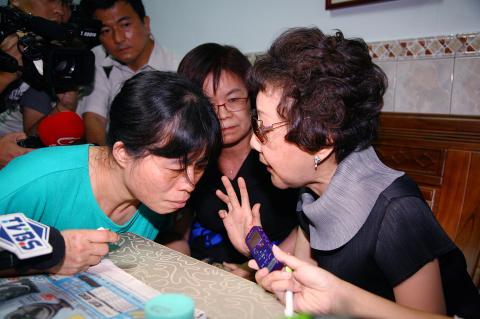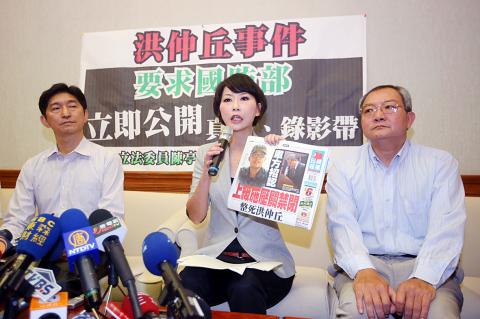The vice commander of the army’s 542nd Brigade, Colonel Ho Chiang-chung (何江忠), was yesterday detained over his alleged role in the July 4 death of army corporal Hung Chung-chiu (洪仲丘).
The Ministry of National Defense said the Military High Court at 10:40am granted military prosecutors’ request to detain Ho. Ho is the first senior military official to be detained over Hung’s death.
The ministry said Ho was suspected of using his position of authority to force other brigade officers to have Hung punished with confinement a few days before he was set to be discharged from the military.

Photo: CNA
Ho is alleged to have committed offenses to personal liberty by a public authority, the offense of coercion by a public authority — both included in the Criminal Code — and the offense of punishing military personnel with categories of punishment not included in the regulations of the Armed Forces Criminal Act (陸海空軍刑法).
The ministry said military prosecutors believe Ho may collude with others and might destroy evidence if he were allowed to remain at liberty.
Senior military prosecutor Major General Tsao Chin-sheng (曹金生) said on Monday that Hung was placed in confinement after senior officers coerced subordinates into carrying out the punishment.

Photo: CNA
Hung, 23, was serving in the army’s 542nd Brigade in Hsinchu County and was due to be discharged on July 6. He was transferred to the 269th Brigade in Taoyuan on June 28 for disciplinary action after he brought a smartphone with a camera onto the base without permission when returning from vacation on June 23.
After being released from confinement on July 3, Hung suffered heat exhaustion during a training session on July 3 and was sent to a military hospital in Taipei.
Hung died at the hospital of multiple organ failure after efforts to resuscitate him failed.
Democratic Progressive Party (DPP) Legislator Hsiao Bi-khim (蕭美琴), who is the convener of the legislature’s Foreign Affairs and National Defense Committee, said she had invited committee members to visit the detention facility in Yangmei Township (楊梅), Taoyuan County, where Hung died.
“I arranged the inspection to assess Hung’s situation while in confinement and to better understand the management and the environment of the military’s confinement system,” she added.
DPP Chairman Su Tseng-chang (蘇貞昌) said President Ma Ying-jeou (馬英九), as commander-in-chief, must offer a clear explanation of the case as it is “not just the a death of a soldier, but a serious loophole and defect of the Taiwanese military.”
DPP Legislator Chen Ting-fei (陳亭妃) urged the ministry at a press conference yesterday to make the findings of its investigation into Hung’s death public within three days, adding that there were at least eight questionable areas in the case, among them missing surveillance video recordings and the logic behind Hung’s unit’s heavy training session.
While public outrage has been directed at the missing video footage, which should have shown how Hung was disciplined and how his supervisors reacted after he collapsed, Tsao told a press conference that the location where Hung was taken ill on July 3 was not covered by surveillance cameras, so there was no footage available.
The surveillance video recordings of Hung’s unit’s training session on July 1, of which an 80-minute section reportedly went missing, has been submitted to the Ministry of Justice’s Bureau of Investigation for examination, Tsao said.
Neither the 269th Brigade nor the ministry has attempted to keep the video recordings from the public, Tsao said.
DPP Legislator Mark Chen (陳唐山) said only the “100 percent truth” of this case would be able to save the tarnished image of the military and restore people’s confidence in an all-volunteer force, adding that all military personnel should be able to tell the difference between grueling training and “torture.”
Meanwhile, Chinese Nationalist Party (KMT) Legislator Alex Tsai (蔡正元) said that the rejection of Minister of National Defense Kao Hua-chu’s (高華柱) offer to resign showed that Ma and Premier Jiang Yi-huah (江宜樺) did not take the public and their feelings about Hung’s death seriously.
“They do not understand that people are indignant about the matter,” Tsai said.
Tsai compared Ma’s reaction to Hung’s death with his reaction to the 1997 kidnapping and murder of Pai Hsiao-yen (白曉燕), the 17-year-old daughter of TV entertainer Pai Ping-ping (白冰冰).
Ma, who was minister without portfolio at the time, resigned from the Cabinet to take responsibility after a wave of serious crimes, when none of the other Cabinet members offered to resign to quell public outcry, even though Ma had no specific responsibility for such matters, Tsai said.
“Could it be that Ma is of the opinion that what led to Hung’s death is less severe than the murder of Pai Hsiao-yen?” Tsai said.
Meanwhile, DPP legislators Hsu Chih-chieh (許智傑) and Tsai Huang-liang (蔡煌瑯) held a separate press conference to appeal for an investigation into the controversial death of a serviceman in 2008.
The parents of air force staff sergeant Tsai Hsueh-liang (蔡學良) told the news conference that they still have doubts about the cause of their son’s death, which military investigators labeled a suicide. They appealed to the defense ministry to launch a new investigation.
There was not enough evidence to support the finding that their son’s head wounds were caused by him shooting himself with a T65 rifle because his wounds and the bullet trajectory were inconsistent, Tsai’s parents said.
Hsu said new evidence appeared to suggest that Tsai’s wounds were caused by bullet from a pistol rather than a T65 rifle.
Additional reporting by Shih Hsiu-chuan

The Ministry of Foreign Affairs (MOFA) yesterday said it is closely monitoring developments in Venezuela, and would continue to cooperate with democratic allies and work together for regional and global security, stability, and prosperity. The remarks came after the US on Saturday launched a series of airstrikes in Venezuela and kidnapped Venezuelan President Nicolas Maduro, who was later flown to New York along with his wife. The pair face US charges related to drug trafficking and alleged cooperation with gangs designated as terrorist organizations. Maduro has denied the allegations. The ministry said that it is closely monitoring the political and economic situation

Conflict with Taiwan could leave China with “massive economic disruption, catastrophic military losses, significant social unrest, and devastating sanctions,” a US think tank said in a report released on Monday. The German Marshall Fund released a report titled If China Attacks Taiwan: The Consequences for China of “Minor Conflict” and “Major War” Scenarios. The report details the “massive” economic, military, social and international costs to China in the event of a minor conflict or major war with Taiwan, estimating that the Chinese People’s Liberation Army (PLA) could sustain losses of more than half of its active-duty ground forces, including 100,000 troops. Understanding Chinese

UNRELENTING: China attempted cyberattacks on Taiwan’s critical infrastructure 2.63 million times per day last year, up from 1.23 million in 2023, the NSB said China’s cyberarmy has long engaged in cyberattacks against Taiwan’s critical infrastructure, employing diverse and evolving tactics, the National Security Bureau (NSB) said yesterday, adding that cyberattacks on critical energy infrastructure last year increased 10-fold compared with the previous year. The NSB yesterday released a report titled Analysis on China’s Cyber Threats to Taiwan’s Critical Infrastructure in 2025, outlining the number of cyberattacks, major tactics and hacker groups. Taiwan’s national intelligence community identified a large number of cybersecurity incidents last year, the bureau said in a statement. China’s cyberarmy last year launched an average of 2.63 million intrusion attempts per day targeting Taiwan’s critical

‘SLICING METHOD’: In the event of a blockade, the China Coast Guard would intercept Taiwanese ships while its navy would seek to deter foreign intervention China’s military drills around Taiwan this week signaled potential strategies to cut the nation off from energy supplies and foreign military assistance, a US think tank report said. The Chinese People’s Liberation Army (PLA) conducted what it called “Justice Mission 2025” exercises from Monday to Tuesday in five maritime zones and airspace around Taiwan, calling them a warning to “Taiwanese independence” forces. In a report released on Wednesday, the Institute for the Study of War said the exercises effectively simulated blocking shipping routes to major port cities, including Kaohsiung, Keelung and Hualien. Taiwan would be highly vulnerable under such a blockade, because it